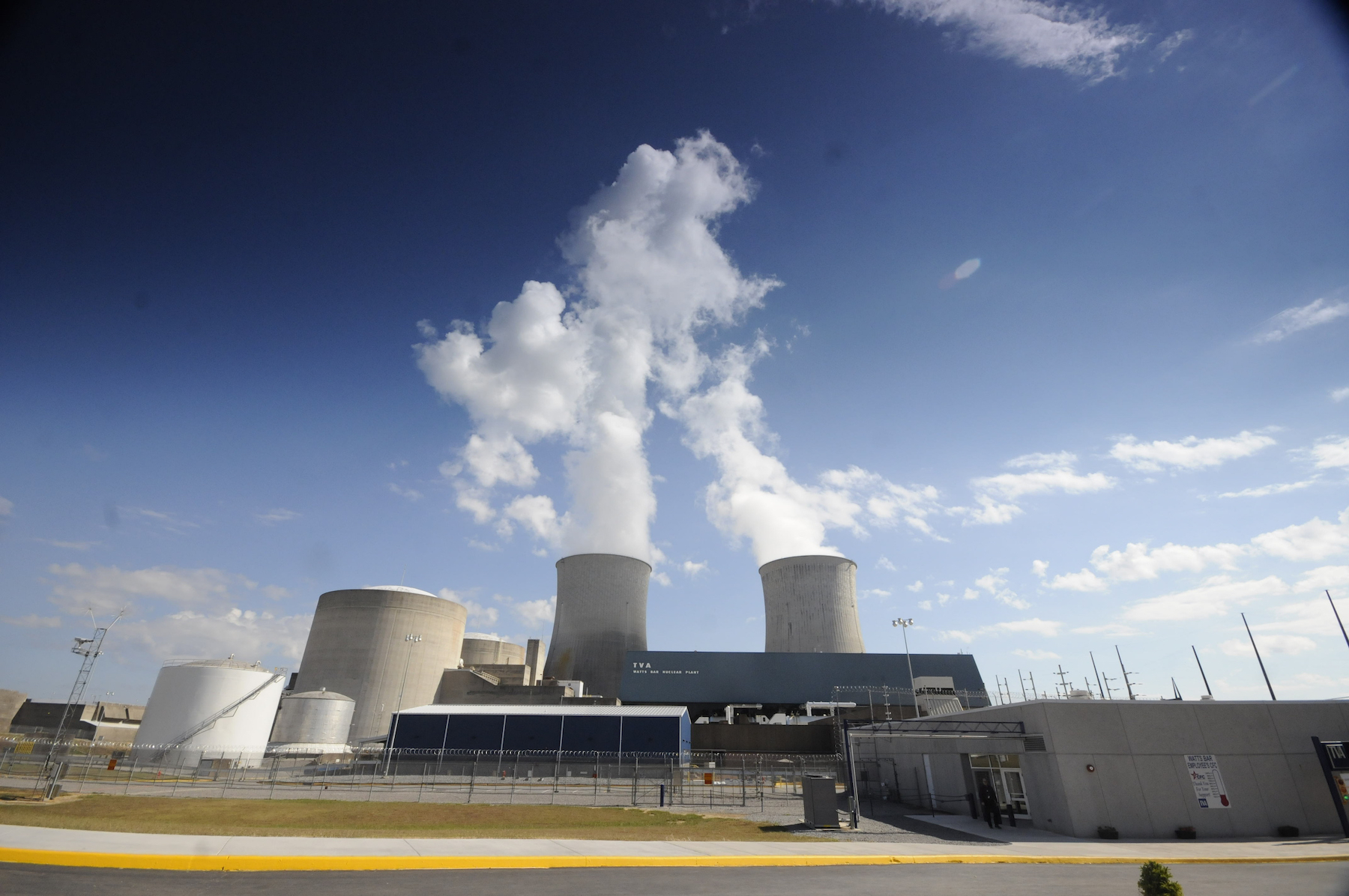Tennessee should position itself as the nation's leader in developing the next generation of nuclear power, according to Gov. Bill Lee.
In the state where the power of the atom was first harnessed at the "secret city" built on the Oak Ridge reservation during World War II, Lee said another generation of nuclear power that is cleaner and more flexible should be developed.
"Tennessee can, and should be, the leader in nuclear energy for America," Lee said in his annual State of the State address Monday. "As Washington debates an agenda that over regulates or pushes a burden on everyday people, Tennessee is looking for real solutions through innovation."
Lee said he plans to include $50 million in his fiscal 2024 budget to provide grants and assistance for nuclear power-related businesses that relocate or grow in Tennessee. The governor said his nuclear fast-track fund will "recruit companies to our state that will specifically establish a nuclear development and manufacturing ecosystem built for the future of Tennessee."
Although fewer than half of the nuclear plants launched a generation ago in the Tennessee Valley were ever finished, Lee said nuclear power will be key to America achieving carbon-free energy in the future.
The Tennessee Valley Authority has obtained the first site permit in the country to build small modular nuclear reactors on the Clinch River near the Oak Ridge National Laboratory, which first harnessed the peaceful power of the atom after World War II. TVA has partnered with Ontario Power Generation, the largest public power utility in Canada, to develop the GE Hitachi small modular reactor design.
TVA President Jeff Lyash and other proponents of the smaller reactors believe such units could be largely built in a factory and deployed in smaller increments to provide more flexible and cost-effective power than the previous generation of larger nuclear power plants such as TVA's Sequoyah and Watts Bar nuclear plants in East Tennessee.
A modern-day Manhattan project
Developing, building, equipping and servicing the next generation of nuclear power could open up many new business opportunities in Tennessee.
"Building on our Manhattan Project-era legacy of nuclear innovation, East Tennessee is again at the forefront of new nuclear technologies that have the potential to change the world," Tracy Boatner, president of the East Tennessee Economic Council, said in an emailed statement.
Boatner said Lee's proposal to offer fast-track grants to aid nuclear power-related businesses "means a lot to companies in this industry." Boatner said nearly 150 nuclear power-related companies are already operating in Tennessee.
"In addition to the financial support, it publicly conveys the state's support for innovators in the nuclear industry," he said of Lee's nuclear fast-track proposal. "It says, "Come to Tennessee! We believe in your mission to create a clean-energy future, and we support you."
Nuclear division
But not all Tennesseans favor the push for more nuclear power. Sandy Kurtz, co-president of Blue Ridge Environmental Defense League and a longtime anti-nuclear activist, said earlier investments in nuclear power have ended up costing too much, taking too long to build and subjecting the public to risks of radioactive leaks.
"Nuclear power is too slow, too costly and unsafe, so the better alternative would be to move quickly to less expensive and more safe renewable energy," Kurtz said in a telephone interview Friday. "There's plenty of jobs and business opportunities there as well."
The nuclear reactors built over the past half century have often proven to be costlier and taken much longer to build than expected. TVA completed seven of the 17 reactors it began planning or building in the 1960s and 70s, leaving the federal utility with more than $10 billion of stranded investments in projects that were never completed. The latest nuclear reactor TVA built, the unit 2 reactor at its Watts Bar Nuclear Plant near Spring City, took more than 40 years to complete and had a price tag that was several times what was originally forecast.
The only new nuclear plant now under construction in the United States is at Plant Vogtle in Georgia, which is owned by Georgia Power, Dalton Utilities and the Municipal Electric Authority of Georgia. The two new reactors being added at Vogtle cost more than $30 billion to construct. When approved in 2012, the first new nuclear reactors to be built in decades were estimated to cost $14 billion.
New and smaller design
By building similar and smaller reactors in a factory, the nuclear industry claims small modular reactors could be built better in the future at less cost and offer more flexibility. Although solar and wind energy is growing, Lyash and Lee contend that nuclear and other baseload power generation is still needed to keep the lights on when the sun doesn't shine or the wind doesn't blow, and electric-powered vehicles demand more clean energy to replace gasoline and other fossil fuels.
"There is no long-term national strategy that does not include nuclear energy," Lee said. "We have a solution that's cheap, clean and reliable. No other state in the country comes close to Tennessee's legacy, resources and potential to be a leader in nuclear energy."
Lee has previously voiced support for nuclear power, promoting atomic energy in each of his past two State of the State addresses. After touring TVA's Watts Bar nuclear plant last year, Lee touted nuclear power as "reliable, clean and low-cost" and said TVA's development of new small modular reactors could help propel more business in the state.
The nuclear industry also has a strong Tennessee voice in Congress from U.S. Rep. Chuck Fleischmann, an Ooltewah Republican who is the only Tennessee congressman on the House Appropriations Committee. He is also chairman of the bi-partisan House Nuclear Cleanup Caucus and is co-chairman of other Congressional caucuses on nuclear labs, nuclear fuel and advanced nuclear.
"Republicans in the Congress are all-in on nuclear, and we've got about half the Democrats, and that is growing," Fleischmann said last month in an interview with the Chattanooga Times Free Press. "We could never get (former House Speaker) Nancy Pelosi on nuclear, but some of the newer Democrats elected to the House are more supportive of nuclear power and are willing to join our caucuses and work to advance nuclear energy."
Last year, a site in Oak Ridge, Tennessee, was chosen for the first commercial high-assay low-enriched uranium-based fuel fabrication facility in the country. The $300 million TRISO-X Fuel Fabrication Facility is expected to start up as soon as 2025. The plant is being designed to initially produce eight tons of fuel per year -- enough to support about 12 small modular reactors.
TVA and other utilities that are members of the Nuclear Energy Institute project nuclear power output could nearly double by 2050 and add 90 gigawatts of nuclear power to the U.S. grid over the next three decades. Maria Korsnick, president and chief executive officer of the institute, said in a statement last month that is equivalent to about 300 new small modular reactors.
"We have the innovation, we have the capability, we have the American ingenuity," she said. "There's no reason that we shouldn't be able to to bring these products to market."
U.S. nuclear electricity generation capacity peaked at 102 gigawatts in 2012, when there were 104 operating nuclear reactors, according to the U.S. Energy Information Administration. The nation's 92 operating reactors have nearly 95 gigawatts of capacity.
Contact Dave Flessner at dflessner@timesfreepress.com or 423-757-6340.

